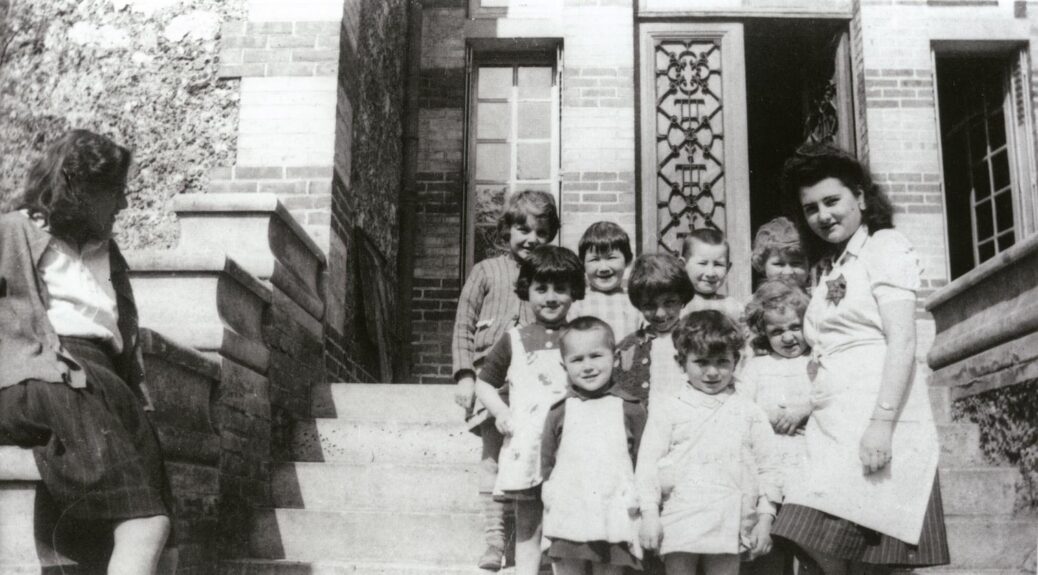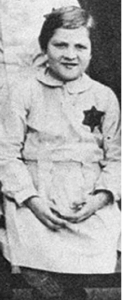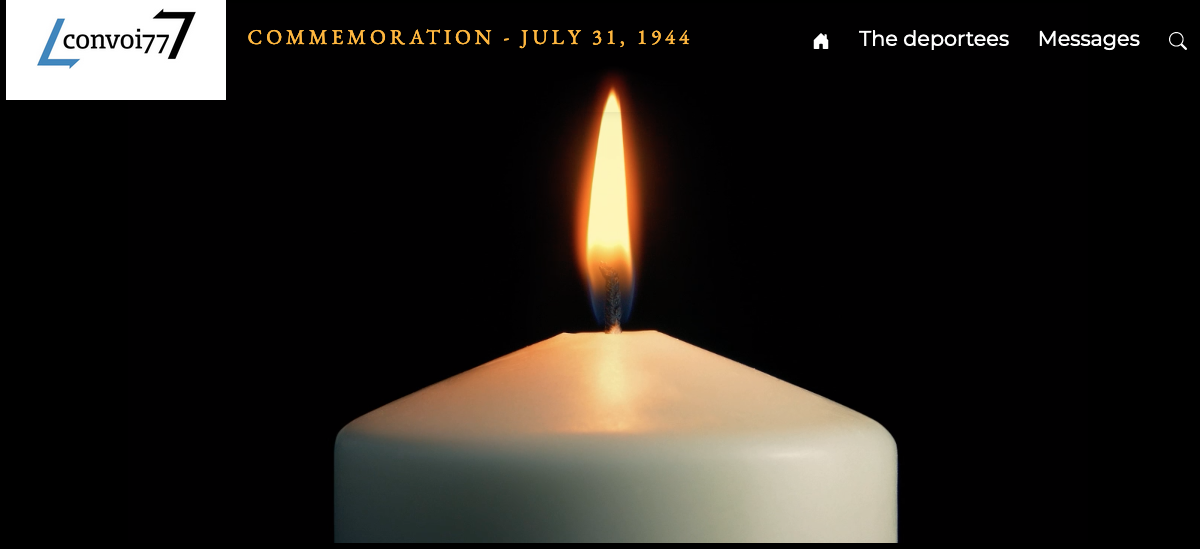Régine REIN
We (Katie Ennon, Amarine Bernard, Prudence Moreau, Anouck Ranger and Margaux Rocher) are five high school students from the Victor Hugo school in Poitiers, in the Vienne department of France, who decided to embark on writing a biography of Régine Rein. We had the opportunity to take part in a historical project suggested by our humanities, literature and philosophy teacher, to pay tribute to the victims of the Holocaust. At the same time, we discovered more about the past at a local level, by following in the footsteps of a child who lived in Poitiers. It was important to us to make the stories of the Jews ring out, while at the same time fulfilling our duty of passing on the memory of the Shoah and conducting research to ensure that we never forget to keep that memory alive.
I/ Régine Rein’s childhood
Régine Rein, whose parents were Gitla Einsenbach and Jacob Rein, was born on May 20, 1937 at 98 rue de Strasbourg in Nancy, in Eastern France. She had one brother and one sister: Henri, who was born on September 25, 1921 in Tarnow, Poland, and Rosa, who was born on July 15, 1925 in the same town. Her father, a tailor, was born on February 7, 1889 in Obertyn, Ukraine, and her mother, who did not work outside the home, was born on August 10, 1897 in Tarnow, Poland. In 1936, their parents were living at 15 rue Saint Thiébault in Nancy and then in 1939 they moved to a third-floor apartment at 70 rue de la Hache, also in Nancy. At that time, the Meurthe-et-Moselle department was under German occupation, and the Jews were soon confronted with the same persecution as those in other Axis countries.
II/ The arrest and deportation of her family members
Given that the Germans were occupying the north of France, the family fled south to the Vienne department, where they appear to have lived for some time in Sanxay, which is where they were arrested between 1941 and 1942. Régine’s mother, Gitla, was deported on Convoy No. 8 from Angers to Auschwitz on July 20, 1942. Her father Jacob, brother Henri and sister Rosa were deported on Convoy no. 26 from Drancy camp to Auschwitz on August 31, 1942.
Régine herself was arrested in Loudun on May 17, 1943 and was taken to the Poitiers camp.
III/ The camp in Poitiers
Until December 4, 1940, the concentration camp was only used to hold Spanish (Republican) refugees, who were housed in barracks alongside the Poitiers to Limoges road. At this point, it was decided that Gypsies, other travelers and Jews would all be interned there. The camp on the Limoges road was run by a number of different managers, and regularly monitored by a chief inspector. It was they who were responsible for transferring Jews to Drancy and deporting them for forced labor. In July 1942, on the orders of the German authorities, the French State Police carried out a census, and the Prefect issued a request that children be added to the list. Régine Rein was no doubt one of them. She was taken to the camp on the Limoges road in Poitiers for the first time on Monday May 24, 1943, but we have not yet been able to find out when she was released.
Paul Lévy’s research on the Limoges road camp reveals the conditions that Régine had put up with during her time there. We know that the internees were malnourished and that life in the camp was unhealthy, as most of them were riddled with lice.
In addition, the camp’s financial resources were insufficient to buy new clothes, which was why the internees wore tattered clothes and often had no shoes, despite the help of French National Aid fund. The Ministry of the Interior was supposed to allocate a budget to the camp (in 1941) to cover the costs of keeping the internees, as agreed by the Ministry of Finance, which visited the camp after it had requested funds, but two months after the visit, the money had still not arrived. However, Father Fleury and Rabbi Elie Bloch helped out the people in the camp. In 1941, Father Fleury began teaching a class for Jewish and gypsy children of all ages, despite having no teaching materials available to him. As of 1943, despite official reports to the contrary, Jewish children were no longer allowed into the class. Régine Rein was thus unable to take part in Father Fleury’s classes, since she arrived in the camp in May of that year.
IV/ The U.G.I.F (General Union of French Jews)
The U.G.I.F was a Jewish organization set up to provide assistance, welfare and social services. The prefectures and the Gestapo made it compulsory for all Jews to join the U.G.I.F, and at the same time all pre-existing Jewish organizations were closed down. The U.G.I.F. ran its own children’s homes, the first of which were founded at the time of the Vel d’Hiv round-up on July 16 and 17, 1942. Children who were “liberated” from the camps at Drancy, Pithiviers, Beaune-la Rolande and Poitiers had to be placed in U.G.I.F. homes. Estelle was one of these so-called “blocked” children, entrusted to the U.G.I.F. Blocked children’s names were listed in a special police register, and these particular “liberations” were, in reality, a sham. Such children could only be sent to U.G.I.F homes, it was the German authorities who decided where to place them, and they and the Vichy regime kept strict control over them. They were thus assigned to the various U.G.I.F homes: Louveciennes, the Rothschild orphanage, the Zysman boarding house in La Varenne, Saint-Mandé, Neuilly, rue Vauquelin and the vocational school on rue des Rosiers in Paris, and in Montreuil.
Régine was one of the Jewish children who stayed at the Orphelinat agricole de Voisins orphanage in Louveciennes, to the west of Paris, which was one of many such homes run by the U.G.I.F. Before she was transferred to Louveciennes, Régine had been placed in the “La Sansonnerie” children’s home in Migné-Auxances, in the Vienne department of France.
As was the case with the other U.G.I.F. homes, Louveciennes was first and foremost a safe haven for the children of Jewish families facing persecution. Louveciennes was an exceptionally overcrowded home. In common with most U.G.I.F. homes, its financial resources were limited, but the staff did everything in their power to make sure the children were well cared for, had enough to eat and were kept safe.
Denise Holstein, who was 17 years old at the time, was one of the girls who took care of the children at Louveciennes.
On January 1, 1944, when the Germans requisitioned the orphanage, the children and staff moved to a large villa at 18 rue de la Paix, which is where they were subsequently arrested on July 22.
Aloïs Brunner, the commandant of Drancy camp, issued the order for a series of roundups of all the U.G.I.F homes for Jewish children, in retaliation for the failed attempt on Hitler’s life on July 20, 1944, and for various Resistance operations in France. On the night of July 21-22, 1944, the Gestapo carried out a sweep of the U.G.I.F. children’s homes, which housed the children of French Jews, most of whom had already been deported and murdered, and some foreign Jewish children. During this crackdown, eight children’s homes were raided, and both residents and staff were taken prisoner and subsequently deported. More than three hundred innocent children were arrested that night.
The children in the Louveciennes home were woken up at dawn and told to get out of bed and to wait for the Gestapo cars. Mr. Luoy, the manager of the home, was also arrested, along with his family, but they were later released. Forty-one children from Louveciennes were arrested and placed in detention; the following day, seven children were deported to Bergen-Belsen, where they ultimately survived the war.
V/ The transfer to Drancy and deportation to Auschwitz
The children were taken to an unknown destination: Drancy camp, the departure point of Convoy 77, where Régine was interned on July 22, 1944. Her registration number in Drancy was 255524. She was assigned a second-floor room on staircase 7, and on July 31, 1944 she was deported on Convoy 77 to Auschwitz, from which she never returned. All of the children were sent to the gas chambers and killed as soon as they arrived, with the exception of Denise Holstein, Régine Sokol and Georgette Zuckermann, another of the five supervisors. Régine died in Auschwitz between August 3 and 1944, when she was just 7 years old.
Thirty-three young children from Louveciennes were murdered on arrival in Auschwitz. Only one teenager, Denise Holstein, survived to tell the story of the Louveciennes home: on the ramp at Birkenau, another deportee who was a “sonderkommando” approached her and warned her not to keep any children with her. She was therefore selected to work in the concentration camp and spared death, unlike the others, who were sent straight to the gas chambers.
And so it was that on July 31, 1944, less than a month before Paris was liberated, one of the largest deportation convoys of French Jews left Drancy for Auschwitz. Convoy 77 was made up of more than 1,300 people, including some 300 children, most of them from the U.G.I.F homes in and around Paris. “The Jews who worked for the U.G.I.F thought they would be able to save Jews, but only realized much later, mainly when it was too late, that the U.G.I.F had turned out to be a trap for many of those who had been in its care,” explains Antoine Vitkine.


 Français
Français Polski
Polski










